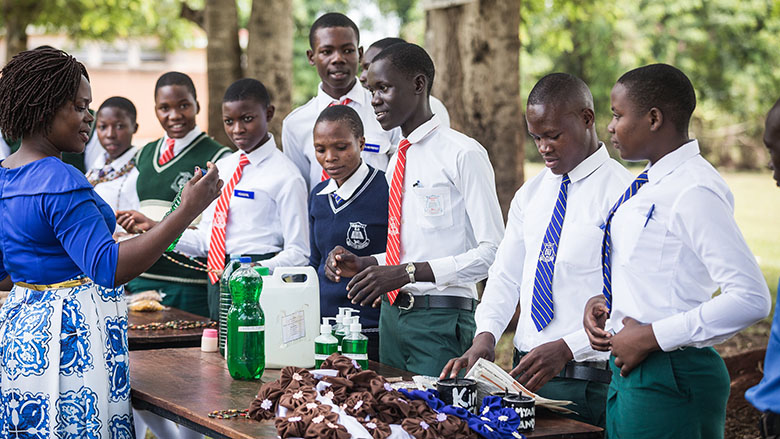Presented by the Learning Assessment Platform (LeAP) and the Skills Global Solutions Group at the World Bank.
Building and assessing youth skills remotely during COVID-19: The experience of Educate! in East Africa
March 11, 2021
ONLINE | Thursday, March 11, 9:00 AM – 10:30 AM EST

-
BACKGROUND
In early 2020, most countries around the world made the decision to partially or fully close schools to contain the spread of the coronavirus (COVID-19), affecting 90% of the world’s learners. Without the ability to provide in-person instruction, countries have turned to delivering learning content to students and parents through various modalities, including online, TV/radio, and via delivery of hard-copy learning packets. As countries’ experience over the last year have shown, many children and youth do not have access to digital resources, due to poor connectivity or limited access to digital devices. In this context, more low-tech and readily available modalities, such as basic mobile phones, can facilitate learning continuity by ensuring that learning resources are effectively used and that students continue to move along their learning trajectory.
At the same time, the COVID-19 crisis has demonstrated the importance of socioemotional skills for coping with the adversities and uncertainties brought about by the pandemic. To prevent demotivation and dropout during these turbulent times necessitates a sharp focus on fostering the skills that can help students weather this crisis, such as adaptability, self-efficacy, and resilience to setbacks, and building up their capacity for self-directed learning until they can return to the classrooms.
WEBINAR
In this webinar, Educate! will present the organization’s approach to building a comprehensive skill set for youth, discuss how Educate! adapted its flagship model for low-tech remote delivery and skills assessment amidst widespread school closures, and share the lessons they have learned thus far.
Over the last year, Educate! has had to rapidly transform its evidence-based in-school model, which delivers hands-on transferable skills, entrepreneurship, and workforce readiness training for secondary school students and prioritizes socioemotional skills, such as communication, teamwork, creativity, and grit. As COVID-19 closed schools, Educate! responded by delivering a flexible distance learning experience, utilizing accessible technologies like radio, SMS, and phone calls. To support the development of socioemotional skills, this model needed to both provide interesting and relevant content to students, and also engage them in mentorship and practical experience, two key program elements that motivate learners and help them build and practice new skills in the real world. To help ensure the model’s effectiveness, Educate! adapted its measurement and assessment tools to fit new delivery methods, integrating SMS-based remote skills assessment into programming to generate rigorous and rapid measures of effectiveness. With the help of these tools, Educate! demonstrated promising initial results of a 6-week conference call-based bootcamp.
ABOUT EDUCATE!
For over a decade, Educate! has worked to prepare youth in Africa (Uganda, Rwanda, and Kenya) with the skills to succeed in today's economy. The organization pursues an evidence-based approach to youth skill development in partnership with governments, schools, and with young people themselves, and has advised on three education reforms. An impact evaluation of this program revealed that 3.5 years after graduating from secondary school, Educate! participants are better off than their peers in socioemotional skills (such as creativity, grit, and self-efficacy), educational attainment, and gender equity.
-
- Innovations for Poverty Action - Soft Skills and Entrepreneurship Training for Secondary School Students in Uganda
- RCT 4-Year Follow-On Interpretation Memo
- Brookings — How COVID-era innovation can build more equitable education systems
- Educate! – COVID-19 Response (including examples of radio lessons and SMS messages from the Distance Learning Model)
-